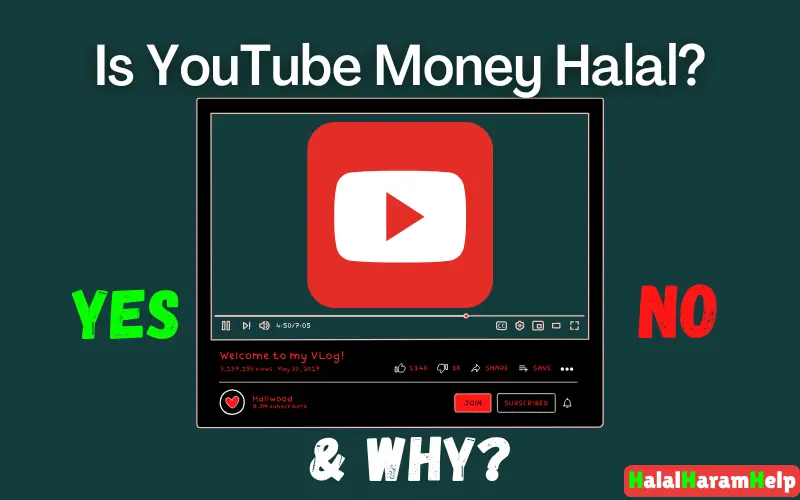Are you a content creator on YouTube wondering if your earnings align with your values? With so many ways to monetize content, it’s crucial to think beyond the numbers.
Whether you’re just starting out or already have a following, understanding the implications of your income can make all the difference.
Before you hit that upload button, have you ever questioned the source of your YouTube money?
Today, let’s dive into the considerations every Muslim YouTuber should know about.

Is YouTube Money Halal?
Yes, YouTube money can be halal, but it depends on several factors, including the nature of your content, the ads shown, and the products or services you promote.
Earning money through YouTube is permissible in Islam as long as it aligns with Islamic principles.
However, the path to ensuring your earnings are halal requires careful consideration of various elements involved in content creation and monetization.
You might also like to know is credit card halal.
1. Content Creation
The first and most crucial step in making sure your YouTube income is halal is to ensure that the content you create adheres to Islamic guidelines.
This means avoiding topics or themes that contradict Islamic values. Content that involves nudity, profanity, gambling, or any other haram (forbidden) activities is not permissible.
Additionally, it’s important to be mindful of the language and tone used in your videos, ensuring they are respectful and appropriate.
Creating educational, entertaining, or informative content that benefits your audience can be a great way to ensure your channel remains within halal boundaries.
The intention behind your content should be to provide value, educate, or entertain in a manner that is respectful and aligns with Islamic teachings.
2. Google Ads
One of the most popular ways to monetize a YouTube channel is through Google AdSense, which displays ads on your videos.
The income you generate from these ads can be halal, but only if the ads themselves are halal.
To ensure your earnings are permissible, you need to take an active role in monitoring the ads that appear on your videos.
While Google automatically filters out inappropriate content to some extent, it’s still important for you to review the ads personally.
You can do this through your Google AdSense dashboard, where you have the option to block certain categories of ads that may not align with Islamic values.
3. Affiliate Marketing
Affiliate marketing is another popular way to earn money on YouTube, where you promote products or services and earn a commission on sales made through your referral links.
For affiliate earnings to be halal, the products or services you promote must comply with Islamic law.
This means you should avoid promoting products that are haram or any products that deceive or harm consumers.
It’s also important to ensure that the products are of good quality, fairly priced, and provide genuine value to your audience.
Transparency is key in affiliate marketing, and you should always disclose when you’re promoting a product through an affiliate link.
4. Sponsored Content
Many YouTubers earn money through sponsorships, where brands pay you to promote their products or services.
As with affiliate marketing, it’s essential to ensure that any products or brands you promote are halal and align with Islamic teachings.
Before agreeing to a sponsorship, research the brand and its products thoroughly. Make sure they do not engage in practices that are haram or exploitative. The products should be beneficial, of good quality, and not overpriced.
Additionally, be transparent with your audience about sponsored content to maintain trust and avoid misleading them.
Just as with affiliate marketing, your goal should be to offer genuine value to your audience without compromising your principles.
Also learn is debt card halal.
5. Selling Products Or Courses
If you sell your own products, courses, or services through your YouTube channel, it’s important to ensure that they are halal.
The content of the courses or the nature of the products should be in line with Islamic teachings and should not deceive or harm your customers.
Make sure the products are beneficial, fairly priced, and of good quality. If you have any doubts about whether your product or service is halal, it’s better to avoid offering it or consult with a knowledgeable Islamic scholar for guidance.
Transparency with your customers is crucial, and you should avoid any form of deception in your sales tactics.
FAQs
Q1. Are YouTube earnings haram?
A: YouTube earnings can be halal or haram, depending on the content and earning ways.
Q2. Can you be a YouTuber in Islam?
A: Yes, as long as your content aligns with Islamic principles.
Q3. Is YouTube Shorts income halal?
A: Yes, if the content and ads are in accordance with Islamic guidelines.
Q4. Is AdSense income halal?
A: AdSense income is halal if the ads shown do not promote haram products or services.
If you’re promoting a Black Friday sale, also learn is black friday haram.
Conclusion
In conclusion, earning money through YouTube can be halal if it aligns with Islamic teachings.
It requires careful attention to the content you create, the ads displayed, and the products you promote.
By ensuring that everything you produce and endorse adheres to Islamic principles, you can build a successful and ethical YouTube channel.
Stay true to your values, be mindful of your income sources, and remember that with the right approach, your YouTube earnings can be both rewarding and halal.


